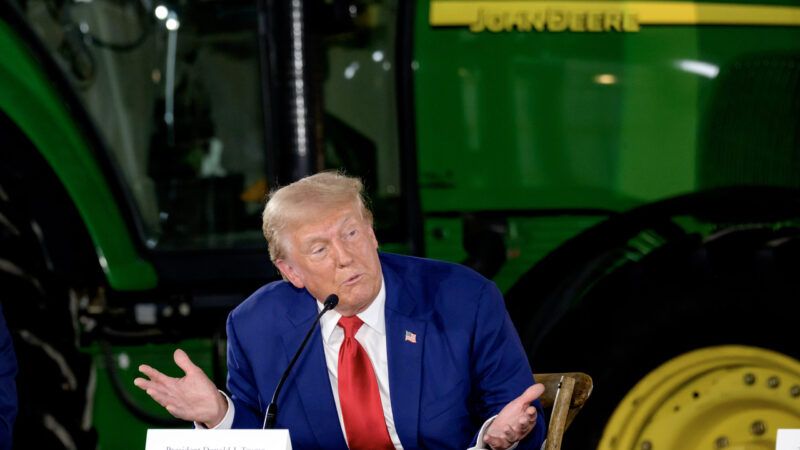Trump's Planned Farm Bailout Should Require Congressional Approval
The Trump administration has already claimed the power to raise taxes without congressional approval. Now it is going to spend money that way too.

By hiking tariffs on nearly all imports to the United States earlier this year, President Donald Trump effectively imposed one of the largest tax hikes in American history—and did so without congressional approval.
Now, the Trump administration is reportedly preparing to spend some of the revenue from those tax increases—also without congressional approval.
The White House is preparing a bailout for farmers harmed by the trade war. The exact contours of the package remain unclear for now, but Politico and The Wall Street Journal both report that the administration is eying at least $10 billion in aid. We'll know more early next week, as Treasury Secretary Scott Bessent says an announcement of "substantial support" is expected on Tuesday.
This much seems clear: tariffs paid by American importers will be used to fund some of the bailout.
That's likely to happen, in part, because the slush fund that Trump tapped to bail out farmers during his first term is running dry. That fund—the Commodity Credit Corporation, a New Deal-era program within the Department of Agriculture—has just $4 billion in it, according to Politico. Meanwhile, the government has collected about $150 billion in tariff revenue during the first eight months of the year.
It also seems likely because that's what Trump keeps saying he wants to do. "We're going to take some of that tariff money that we made, we're going to give it to our farmers," he said last month.
Regardless of how it is funded, a farm bailout would be a wasteful and counterproductive bit of policy—and one that could inspire other tariff-hurt industries to start looking for their own handouts. If the bailout is funded with the tariff revenue (without congressional approval), then it would also be another attack on the separation of powers that are fundamental to our constitutional system of government.
It is Congress that has the sole authority to lay and collect taxes, per Article I of the Constitution. It is also Congress that has the sole authority to determine how tax dollars are spent. If the Trump administration wants to use some of that $150 billion to bail out farmers, it must ask Congress to approve that spending—ideally as part of a budget bill, but even a one-off emergency or supplemental bill would be better than having the executive branch make this decision on its own.
There is one other complication that should stop the administration from unilaterally spending the tariff revenue, even if the White House decides to ignore the constitutional argument.
If the Supreme Court rules that Trump's tariffs are unlawful—as lower courts already have—then it is possible that the federal government would have to refund all that money to the people and businesses that paid the tariffs in the first place.
If that money has been given away to farmers, then taxpayers will be on the hook to refund the tariff payments—the same American taxpayers who are already paying higher prices because of the tariffs. That's literally adding insult to injury.
There is, of course, an easy way out of this mess. If the Trump administration wants to spare farmers the consequences of the trade war, it doesn't need a messy, possibly unconstitutional bailout. It just needs to end the tariffs.


Show Comments (66)